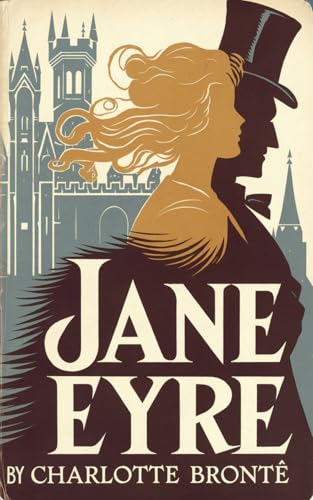Jane Eyre
Charlotte Brontë
BOOK REVIEW

In the realm of classic literature, few works resonate as powerfully as Jane Eyre by Charlotte Brontë. It's not merely a novel; it's a passionate cry for self-respect, autonomy, and the incessant battle for personal identity. The tale of Jane, an orphaned girl who triumphs over adversity, strikes chords that vibrate through the ages - challenging societal norms with its boldness and emotional depth.
The narrative thrusts you into the bleak landscapes of Victorian England, immersing you in Jane's struggles against the oppressive forces of her life. Her childhood is a tempest of neglect and cruelty, but it is through these trials that we witness her indomitable spirit blossoming. Bravo, Brontë! The author doesn't just create a character; she breathes life into a revolutionary idea-the worth of a woman, irrespective of societal constraints.
Over the years, Jane Eyre has prompted enthusiastic discussions and controversies alike. Some readers are mesmerized by Jane's unwavering moral compass, while others critique her romantic entanglements with Mr. Rochester. Is it empowerment or folly? This dilemma ignites debates that rival the roaring fires of the settings within the novel. Critics have noted that Brontë's exploration of passion and independence makes an audacious statement about love's complexities. It forces you to confront uncomfortable truths about sacrifice and fulfillment, opening a Pandora's box of moral quandaries.
Yet, Brontë's pen doesn't merely reflect the shades of her characters' journeys; it illuminates the systemic injustices of her era. The injustices faced by women, particularly the class struggles, reverberate through Jane's narrative, challenging us to reflect on our contemporary societal structures. You cannot help but ponder-how much have we truly changed? The novel is a mirror held up to our society, regardless of the century, compelling readers to examine our own prejudices and privileges.
But let's not overlook the emotions. As Jane traverses the peaks and valleys of despair and joy, you feel that pang of love thwarted and resilience rewarded. Critics have unfurled their banners for both the romantic and feminist readings of the novel, making it a fertile ground for diverse interpretations. You might find yourself rooting for Jane as she defies the constraints of her gender and class, yet moments of her vulnerability may evoke tears, leaving even the stoniest of hearts aching.
Brontë's lyrical prose captures the haunting landscape of human emotion, making us live every moment with Jane. The profound connection you forge with her is both a blessing and a weight. The dichotomy of love and independence, the going against the grain of expectations-all of this paints a portrait of a woman whose fight is relatable even today. Readers historically influenced by Jane Eyre include the likes of Virginia Woolf and Jean Rhys, who later explored similar themes of female autonomy and existential struggle. This novel lays the groundwork for these literary giants, a relentless echo through corridors of literature.
Expectations push against the traditional boundaries of what a woman should be, yet Jane rises, unapologetically herself. Like a phoenix from the ashes, Jane Eyre remains a timeless testament to the fierce, unyielding spirit residing within us all. Reading this novel is not merely an academic exercise; it is an invitation to engage with courage, to question, to strive.
In a world where the quest for identity and equality still rages on, Brontë's masterpiece is more relevant than ever. Can you feel the surge of empowerment? Grab a copy, dive into Jane's world, and transform your perspective on love, independence, and what it means to stand strong against all odds. The journey awaits-be part of it. 🌪
📖 Jane Eyre
✍ by Charlotte Brontë
🧾 313 pages
2019
#jane #eyre #charlotte #bronte #CharlotteBronte